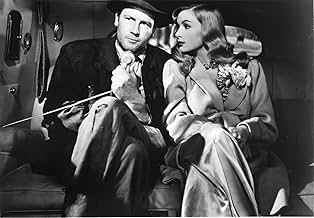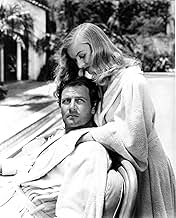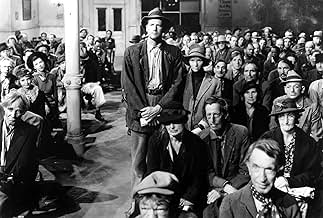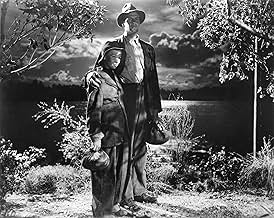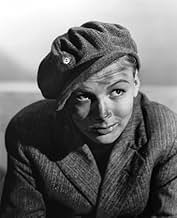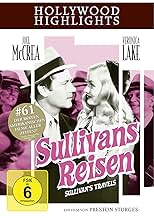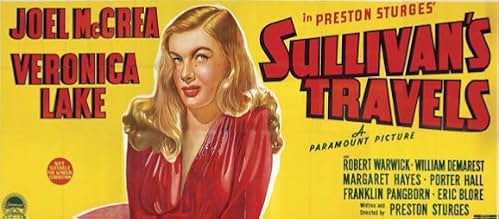Hollywood director John L. Sullivan sets out to experience life as a homeless person in order to gain relevant life experience for his next movie.Hollywood director John L. Sullivan sets out to experience life as a homeless person in order to gain relevant life experience for his next movie.Hollywood director John L. Sullivan sets out to experience life as a homeless person in order to gain relevant life experience for his next movie.
- Awards
- 2 wins
Charles R. Moore
- Colored Chef
- (as Charles Moore)
- Director
- Writer
- All cast & crew
- Production, box office & more at IMDbPro
Storyline
Did you know
- TriviaCinematographer John Seitz admired Preston Sturges' unconventional approach to his work. The opening scene comprised ten pages of dialogue to cover about four and a half minutes of screen time. It was scheduled for two complete days of shooting. On the morning of the first day, Seitz found Sturges inspecting the set with a viewfinder, looking for where he could cut the scene and change camera set-ups. Seitz dared him to do it all in one take. Never one to refuse a dare, Sturges took him up on it, although the nervous Seitz had never attempted to complete a two-day work schedule in one day. With the endorsement of McCrea and the rest of the actors, Sturges pressed on, determined to set a record. The first take was fine, but the camera wobbled a little in the tracking shot following the men from screening room to office, so they tried again. They did two or three takes at the most and that was it - two full days work by 11 a.m. on the first day, a feat that had the entire studio buzzing.
- GoofsWhen Sullivan and the Girl jump off the train and walk to the lunch stand, nothing is visible around the outside of the lunch stand--not a car, tree or anything. When Sullivan asks if the proprietor had seen a land yacht (a big RV), the proprietor points to the side and they look out the window and see the big land yacht parked there. Of course, if it had been there in the first place, Sullivan would have seen it right away and not gone into the lunch stand.
- Quotes
[last lines]
John L. Sullivan: There's a lot to be said for making people laugh. Did you know that that's all some people have? It isn't much, but it's better than nothing in this cockeyed caravan.
- Crazy creditsThe Paramount logo appears as a seal on a package.
The package is opened to reveal a book with the film title on it and the opening credits appear on pages in the book.
- ConnectionsFeatured in The Cinematographer (1951)
- SoundtracksSpring Song
(1844) (uncredited)
Written by Felix Mendelssohn
Played as part of the score when Sullivan starts his experiment
Reprised when he starts a second time
Featured review
When it comes right down to it, what you `think' you want isn't necessarily what you `really' want, nor is it likely to be anything you need. But finding the answer is up to the individual, a prospect that's explored in the satirical `Sullivan's Travels,' directed by Preston Sturges. Movie director John L. Sullivan (Joel McCrea) has made a career of churning out one successful comedy after another, yet he remains unfulfilled. He longs to do a `serious' film, one with meaning, a drama that will leave his mark on the industry and the world. And he has a property that he thinks is perfect, a screenplay entitled `O Brother, Where Art Thou?' The studio he works for, however, balks at the idea; Sullivan's comedies are not only good, they're a cash cow for the studio, so why fool with success?
Sullivan is adamant, though, and determined to make his film he strikes a bargain with the studio and gets the green light. But once he's given the go-ahead, he wants to do it right-- and he realizes that to make a truly meaningful film, he must first experience himself the hardships of life he will be examining in `O Brother.' So with only a dime in his pockets, he sets out on the road to find out what `life' is really all about. And before it's over, he will get all he's looking for and more, in an odyssey that will be unforgettable for Sullivan, and for the audience, as well.
Filled with pathos and poignancy, Sturges' film is an insightful sojourn across the territory of the human condition. It'll make you laugh and it'll make you cry, as along with Sullivan you come face to face with some hard truths about reality. And Sullivan's eventual epiphany regarding his personal wants and needs may be your own, as well, because this is a film with a definite message that is honest and undeniable. A lesson in life delivered subtly and sensitively by Sturges, who makes it entertaining and thought provoking at the same time. It's refreshing, in fact, t discover a film that delivers such an impact without having to resort to any kind of sensationalism, relying instead on the inherent humanity of the story, which Sturges conveys masterfully. With exceptions, of course, it's a sensibility few of today's directors seem to possess. Some notable exceptions would be Ang Lee with `The Ice Storm,' Kenneth Lonergan's `You Can Count On Me' and Tom DiCillo's `Box of Moonlight.' All are films that, like `Sullivan,' are journeys of discovery, profound in sentiment without being overly sentimental. There are more, to be sure, but they seem too few and far between.
One of the elements that makes this film so engaging is its colorful cast of characters, and the actors it employs to bring it to life, beginning with it's star, McCrea, who hits his stride as Sullivan with facility. He credibly reflects Sullivan's ideals and principles with a look, as well as an attitude, that makes it work quite naturally. You can believe this is a man with, perhaps not a naive, but certainly a rather guarded perception of life in the real world. Which is not to say he lacks insight or wisdom; it's merely one of the basic truths this film points out-- that people live within parameters of their own design, established through personal experience and frame of reference. And that's the John Sullivan McCrea presents here, with a portrayal that is honest and incisive.
Veronica Lake was one of the hottest actresses around in 1942 when this film was made, and as the girl who becomes a part of Sullivan's journey, she lends considerable charm and a bit of mystique to the film. It's a fairly straightforward role that benefits from her sparkle and personality; a notable performance that adds a touch of humor and some class to the proceedings, without being particularly exceptional. But watching her, it's easy to understand the attention she received, especially after draping her long blond hair across her eye, peek-a-boo style-- which started a craze that swept the country, while creating an indelible image that ultimately defined her career.
The supporting cast includes Robert Warwick (Mr. Lebrand), William Demarest (Mr. Jones), Franklin Pangborn (Mr. Casalsis), Porter Hall (Mr. Hadrian), Byron Foulger (Mr. Valdelle), Margaret Hayes (Secretary), Robert Greig (Sullivan's Butler) and Eric Blore (Sullivan's Valet). Call it a lesson in life, or a lesson about human nature; however you see it, `Sullivan's Travels' is an experience you're going to remember. Entertaining, enjoyable and enlightening, it's an uplifting appreciation of the way things are, and not necessarily the way you `think' they should be. It's a film that celebrates the comfort to be found in finding your own niche and realizing the importance of whatever it is that you contribute to your world and those around you. It leaves you with a sense of purpose and the understanding that the grass is not always greener on the other side. And it makes your own grass look pretty good in the bargain. It's the magic of the movies. I rate this one 10/10.
Sullivan is adamant, though, and determined to make his film he strikes a bargain with the studio and gets the green light. But once he's given the go-ahead, he wants to do it right-- and he realizes that to make a truly meaningful film, he must first experience himself the hardships of life he will be examining in `O Brother.' So with only a dime in his pockets, he sets out on the road to find out what `life' is really all about. And before it's over, he will get all he's looking for and more, in an odyssey that will be unforgettable for Sullivan, and for the audience, as well.
Filled with pathos and poignancy, Sturges' film is an insightful sojourn across the territory of the human condition. It'll make you laugh and it'll make you cry, as along with Sullivan you come face to face with some hard truths about reality. And Sullivan's eventual epiphany regarding his personal wants and needs may be your own, as well, because this is a film with a definite message that is honest and undeniable. A lesson in life delivered subtly and sensitively by Sturges, who makes it entertaining and thought provoking at the same time. It's refreshing, in fact, t discover a film that delivers such an impact without having to resort to any kind of sensationalism, relying instead on the inherent humanity of the story, which Sturges conveys masterfully. With exceptions, of course, it's a sensibility few of today's directors seem to possess. Some notable exceptions would be Ang Lee with `The Ice Storm,' Kenneth Lonergan's `You Can Count On Me' and Tom DiCillo's `Box of Moonlight.' All are films that, like `Sullivan,' are journeys of discovery, profound in sentiment without being overly sentimental. There are more, to be sure, but they seem too few and far between.
One of the elements that makes this film so engaging is its colorful cast of characters, and the actors it employs to bring it to life, beginning with it's star, McCrea, who hits his stride as Sullivan with facility. He credibly reflects Sullivan's ideals and principles with a look, as well as an attitude, that makes it work quite naturally. You can believe this is a man with, perhaps not a naive, but certainly a rather guarded perception of life in the real world. Which is not to say he lacks insight or wisdom; it's merely one of the basic truths this film points out-- that people live within parameters of their own design, established through personal experience and frame of reference. And that's the John Sullivan McCrea presents here, with a portrayal that is honest and incisive.
Veronica Lake was one of the hottest actresses around in 1942 when this film was made, and as the girl who becomes a part of Sullivan's journey, she lends considerable charm and a bit of mystique to the film. It's a fairly straightforward role that benefits from her sparkle and personality; a notable performance that adds a touch of humor and some class to the proceedings, without being particularly exceptional. But watching her, it's easy to understand the attention she received, especially after draping her long blond hair across her eye, peek-a-boo style-- which started a craze that swept the country, while creating an indelible image that ultimately defined her career.
The supporting cast includes Robert Warwick (Mr. Lebrand), William Demarest (Mr. Jones), Franklin Pangborn (Mr. Casalsis), Porter Hall (Mr. Hadrian), Byron Foulger (Mr. Valdelle), Margaret Hayes (Secretary), Robert Greig (Sullivan's Butler) and Eric Blore (Sullivan's Valet). Call it a lesson in life, or a lesson about human nature; however you see it, `Sullivan's Travels' is an experience you're going to remember. Entertaining, enjoyable and enlightening, it's an uplifting appreciation of the way things are, and not necessarily the way you `think' they should be. It's a film that celebrates the comfort to be found in finding your own niche and realizing the importance of whatever it is that you contribute to your world and those around you. It leaves you with a sense of purpose and the understanding that the grass is not always greener on the other side. And it makes your own grass look pretty good in the bargain. It's the magic of the movies. I rate this one 10/10.
Details
Box office
- Budget
- $689,665 (estimated)
- Gross worldwide
- $10,249
- Runtime1 hour 30 minutes
- Color
- Aspect ratio
- 1.37 : 1
Contribute to this page
Suggest an edit or add missing content



